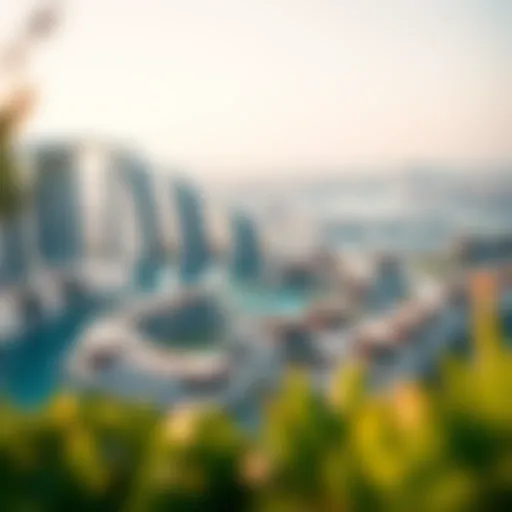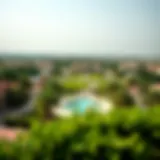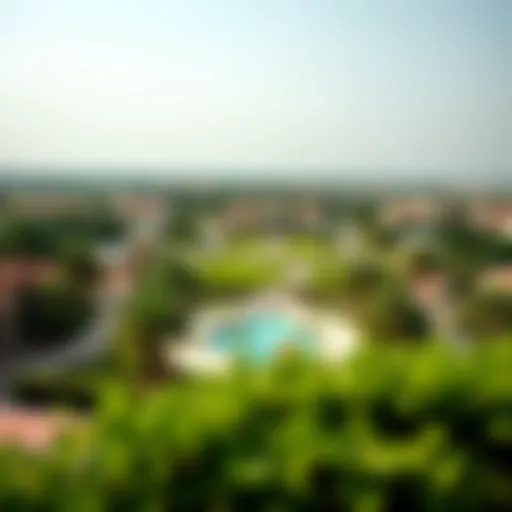Experiencing Ramadan: Traditions and Impact in Dubai
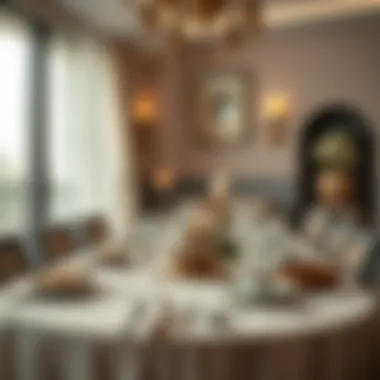

Intro
Ramadan in Dubai paints a picture that transcends mere religious observance. The month weaves itself into the very fabric of daily life across the city, shaping routines, social gatherings, and even business opportunities. From expatriates to long-term residents, everyone feels the spirit of this holy month in profound ways. In a place where modernity meets tradition, Dubai showcases an intricate blend of culinary delights at iftar gatherings, community spirit in charitable acts, and an undeniable uplift in social and economic activities.
Whether you're curious about how Ramadan alters the real estate landscape, or how it influences communal bonds, this exploration offers a comprehensive guide to understanding this vibrant period. As the sun sets, the city comes alive with the sounds of laughter, the sharing of food, and the warmth of community. In short, Ramadan captivates the heart of Dubai, allowing us to dive deeper into its unique experiences.
Market Trends and Analysis
Current Market Conditions
During Ramadan, Dubai's real estate market experiences distinct shifts that correlate directly with increased community engagement and investment opportunities. The festive atmosphere encourages a surge in hospitality-related property rentals—think short-term stays for tourists keen to experience the local culture. Real estate agents often report a spike in inquiries during this time, as many seek accommodation that aligns with religious practices.
- Seasonal Rentals: Many property owners opt to furnish their units for short-term rentals, appealing to those visiting for the month or families gathering for iftar.
- Commercial Developments: New businesses often open their doors catering to the festive spirit, enhancing foot traffic in certain areas while providing temporary leasing opportunities.
Future Predictions and Growth Areas
Analysts speculate that the trends observed during Ramadan will only strengthen in coming years. As Dubai enhances its strategic focus on tourism and cultural events, several growth areas emerge:
- Cultural Centers: With ongoing developments in areas like Dubai Creek Harbour, expect more venues dedicated to cultural celebrations.
- Community Living Spaces: Properties that foster a sense of togetherness will become increasingly appealing, such as shared amenities and communal dining experiences.
"Investors who recognize the cyclical nature of Dubai's property market can benefit significantly during Ramadan, an underappreciated opportunity for growth."
Property Investment Strategies
Types of Properties to Consider
When evaluating property investment during Ramadan, certain types of properties stand out as lucrative options:
- Apartments in Central Areas: Given their proximity to religious sites and iftar gatherings, these are prime choices.
- Luxury Villas: High-end properties remain attractive for expatriates and wealthy locals seeking expansive homes for family gatherings.
Financing Options and Considerations
Understanding the financial landscape during Ramadan is crucial. Lenders frequently introduce special offers around this time, such as:
- Interest Rate Reductions: Many banks offer competitive rates during this month to boost investment.
- Flexible Payment Plans: These can be particularly appealing for first-time investors or those looking to upgrade.
In summary, the interplay between Ramadan's cultural significance and the real estate market in Dubai creates an environment ripe for opportunity. Whether you're networking during iftar dinners or exploring various properties, aligning your investment strategy with the rhythms of this holy month can yield favorable outcomes.
Prologue to Ramadan in Dubai
Ramadan, a holy month for Muslims around the world, carries profound significance in Dubai that goes beyond mere fasting. For a city that prides itself on its multicultural ethos, Ramadan serves as a unifying force, celebrating faith, community, and generosity. This period of reflection and spirituality deeply influences the fabric of daily life in Dubai, making it essential for everyone residing in or visiting this vibrant city to grasp its cultural importance and practices.
Cultural Importance of Ramadan
In Dubai, Ramadan is not just about abstaining from food and drink; it is a time for growth, unity, and spiritual rejuvenation. The nights become vibrant with extravagant celebrations, making it a month where cultural traditions come to the forefront.
- Community Bonds: The sense of community is emphasized as families and friends gather for iftar meals. The breaking of the fast fosters connections between individuals of various backgrounds.
- Generosity and Charity: True to Islamic teachings, the giving of zakat—charitable donations—reaches its peak during Ramadan. Notably, local initiatives and organizations work to support the less fortunate, showcasing the spirit of compassion that defines this month.
- Cultural Festivals: Throughout Ramadan, cultural events are held, reminding people of the rich history and values of the region. From art exhibitions to community fairs, there’s always something happening that reflects Dubai’s diverse heritage.
Without a doubt, Ramadan holds a crucial space in the hearts of residents and visitors alike, offering the chance to deepen their understanding of Dubai’s unique blend of tradition and modernity.
Overview of Islamic Practices
The practices during Ramadan in Dubai are exemplary of Islamic customs while also accommodating the diverse population that inhabits the city. Understanding these rituals helps outsiders appreciate the commitment and discipline of those observing the fast.
- Fasting (Sawm): The primary act of worship during Ramadan is fasting from dawn until sunset. Individuals observe this as a means of spiritual reflection, self-discipline, and empathy towards the underprivileged. Streets, markets, and homes fill with the aroma of iftar meals that literally break the fast at sunset.
- Prayers (Salah): Regular prayers are emphasized; in particular, the Taraweeh prayers are held at mosques nightly. Attendance at these gatherings blooms, with many individuals coming together to engage in worship.
- Reading the Quran: Many strive to read the entire Quran during this month. Special gatherings might be formed specifically for the discussion and interpretation of its passages, illustrating a community’s commitment to spiritual growth.
As we delve deeper into the various facets of life during Ramadan, the understanding of its cultural and spiritual texture becomes imperative for everyone, whether they are residents or new arrivals.
Daily Life Adjustments
During Ramadan, the fabric of daily life in Dubai undergoes significant transformations. These changes are not merely about curbing consumption during daylight hours; they reflect a profound intertwining of cultural observance and social practice that resonates throughout the city. Understanding how daily life adjusts during this holy month holds particular importance for expatriates and residents alike, as it paints a vivid picture of the community ethos in Dubai. From modified work hours to shifts in personal routines, these adjustments cultivate a unique rhythm of life that enhances both the social and spiritual experiences of Ramadan.
Modified Work Hours
In Dubai, many workplaces alter their operating hours during Ramadan. A typical nine-to-five work routine is largely restructured to accommodate fasting employees, leading to shorter workdays. This adjustment is crucial; employees often appreciate the extra time to prepare for iftar, the meal that breaks the fast at sunset.
These modified hours serve dual purposes. First, they reflect respect for the sacred nature of Ramadan. Employers aim to foster a supportive environment that acknowledges the challenges of fasting. Secondly, it allows for enhanced productivity during the hours when employees are most alert. After all, working through hunger can undermine concentration and overall job performance.
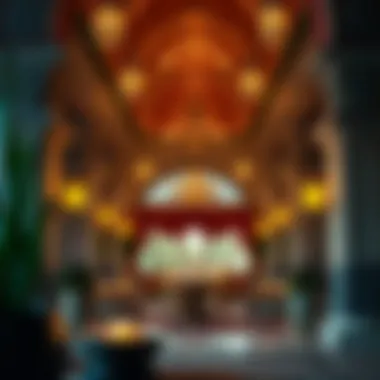

For instance, many firms might operate from 10 AM to 4 PM, keeping in mind that both clients and staff are navigating the same fasting routines. Such changes also influence business operations; marketing strategies may pivot towards post-iftar engagement, showcasing promotions and community activities that take place in the evenings.
Changes in Daily Routine
Ramadan initiates a shift in the daily rhythms of those observing the fast. Mornings are no longer filled with hustle, but often begin in stillness before dawn, where the pre-fast meal, known as suhoor, is enjoyed. Families gather, sometimes sharing this meal in a relaxed atmosphere, strengthening familial bonds.
In the afternoons, the atmosphere in the city morphs. Streets become quieter as most people choose to spend their time at home or in mosques. This change can surprise newcomers, as they witness a different side of Dubai than the usual bustling environment. Retailers and cafes seeing a significant dip in customer traffic during the day often reserve special promotions for after iftar, when activity resumes with energy and enthusiasm.
Even the evening unfolds differently. Friends and families make plans to break their fast together. This collective ritual fosters a sense of community, and many find themselves attending communal iftars organized at mosques or community centers.
These lifestyle adjustments during Ramadan create a unique atmosphere of contemplation, respect, and unity, weaving a rich tapestry of social interactions against the backdrop of spiritual observance.
"Ramadan in Dubai is not just a month of fasting; it's a season of community and connection, making even the simplest of gatherings feel profoundly significant."
Through these daily life adjustments, Dubai’s residents and expatriates alike find new ways to connect with their cultural heritage and with one another, enriching the experience of living and engaging in this vibrant city.
Iftar Traditions
Iftar is not merely a meal in Dubai; it's a vital part of the communal fabric that binds together friends, families, and even strangers during the holy month of Ramadan. This tradition marks the breaking of the fast at sunset, and the significance of this event extends beyond the food itself. It serves as a moment of reflection, gratitude, and togetherness. The diverse nature of Dubai creates an Iftar scene where cultural idioms intermingle, leading to an amalgamation of experiences that can only be found in this city.
Community Celebrations
Dubai’s Iftar celebrations not only display culinary finesse but also foster a sense of unity within the community. Many neighborhoods host communal iftars, where tables are laid out with a variety of dishes, and everyone is welcome—regardless of whether they fast or not. Cultural diversity is on full-display, as locals and expatriates alike bring dishes from their homelands, creating an eclectic feast.
Consider the Sheikh Mohammed Centre for Cultural Understanding (SMCCU), which organizes such gatherings, inviting participants to break bread while exchanging stories and experiences. These celebrations are not just about food; they offer an opportunity for dialogue and understanding among people from varying backgrounds.
"Iftar in Dubai feels like a worldwide banquet, reflecting the rich tapestry of cultures that call this city home."
Popular Iftar Venues
When it comes to where to enjoy iftar, the choices are truly dazzling. Many restaurants, luxury hotels, and even some malls offer specially curated iftar menus that combine traditional flavors with modern twists. The iconic Burj Al Arab, for instance, serves a lavish iftar that features a mix of Middle Eastern favorites alongside global cuisines. However, each venue caters to unique tastes:
- Al Nafoorah: Known for its authentic Lebanese dishes, perfect for experiencing regional flavors.
- Jumeirah Creekside Hotel: Offers a sumptuous buffet featuring international cuisines and live cooking stations.
- Dubai Mall’s food courts: For those looking for a more casual atmosphere, options abound with many stalls providing quick service without losing the festive spirit.
Culinary Highlights of Ramadan
The culinary experiences during Ramadan in Dubai are noteworthy. Traditional dishes such as dates, lentil soup, and fattoush set the stage for the evening's dining experience. However, the season also allows local chefs to showcase their creativity. For instance, many places serve tantalizing desserts like kunafa and qatayef, which are often preferred to satisfy the sweet cravings after a long day of fasting.
Furthermore, the inclusion of various international cuisines is noteworthy. Food trucks pop up, offering everything from gourmet burgers to Asian street food, adding variety to the night market atmosphere. Family gatherings or communal meals often highlight a sense of nostalgia, as many dishes carry stories from generations past.
The vibrant Iftar traditions in Dubai highlight the city's deep-rooted cultural tapestry, attracting not only locals but also expats and tourists eager to experience the warmth and community of Ramadan. Thus, whether you are focusing on family meals or seeking to foster community engagement, Iftar serves as both a physical and spiritual feast.
Spiritual Observances
Ramadan in Dubai is not just a month of fasting; it's a time steeped in spiritual significance and reflection. During this period, the focal point tends to shift towards personal growth, community, and devotion to faith. The observances during this holy month can transform lives profoundly, making it more than an observance of rituals but an integral part of cultural identity for many.
Mosque Activities
The centerpiece of spiritual life during Ramadan in Dubai is undoubtedly the mosque. Mosques serve as gathering points for the community, and their doors remain wide open for everyone—young, old, local, and expatriate alike.
- Taraweeh Prayers: One of the key activities includes the Taraweeh prayers. These are special nightly prayers during Ramadan, where extended recitations of the Quran are made, allowing participants to immerse themselves deeply in spiritual connection.
- Community Iftar: Many mosques host communal iftars, promoting unity among diverse participants. This practice emphasizes togetherness, breaking fast over shared meals can be enlightening, fostering connections that often transcend cultural differences.
- Educational Programs: Mosques also offer programs focused on religious education. From lectures to discussions, these events provide platforms for followers to deepen their understanding of Islam.
Furthermore, several mosques in Dubai, like the Grand Mosque, host Quran recitation competitions, attracting participants of all ages. This promotes not just spirituality, but a deep respect for the Quran among youngsters, who look to their elders for guidance.
Importance of Prayer and Reflection
In essence, Islamic prayer, known as Salah, becomes even more significant during Ramadan. It's a month where time for prayer and personal reflection increases, serving both spiritual and emotional well-being. The act of praying five times a day transforms into not just a routine but a heartfelt calling during this month.
- Mindfulness: Engaging in these prayers promotes mindfulness. In today’s fast-paced world, that pause for reflection is often scarce, yet vital. It invites individuals to ponder their actions, seek forgiveness, and recommit to their spiritual paths.
- Community Cohesion: Regular prayers in congregation also reinforce social bonds. Shared experiences of spiritual devotion in mosques contribute to community ties that are particularly emphasized during Ramadan.
- Personal Growth: The overall atmosphere encourages self-discipline and personal growth. Fasting and prayer cultivate virtues such as patience, humility, and empathy for the less fortunate.
Reflecting on one’s life, values, and long-term goals becomes easier with the calm and solemn environment that Ramadan fosters. As a result, every act of prayer and reflection becomes a stepping stone toward a more fulfilling spiritual journey.
"During Ramadan, it’s as if the world quiets down, and all that matters is one's relationship with the divine."
Charitable Initiatives
During Ramadan, the spirit of giving takes center stage in Dubai. Charitable initiatives are not just a tradition; they form the very fabric of the community, embodying the principles of compassion and empathy prevalent in Islamic practices. The city, known for its luxury and affluence, often sees its wealth channeled into supporting those who are less fortunate during this holy month. These initiatives serve as a reminder of humility and responsibility, inviting everyone—locals and expatriates alike—to take part in communal support.
Community Outreach Programs
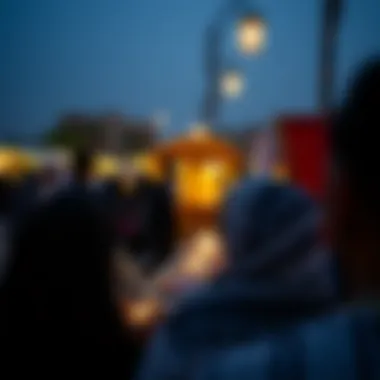

In Dubai, community outreach programs are abundant during Ramadan. Many organizations, from large corporations to smaller grassroots movements, ramp up their efforts to aid the needy. For example, the Emirates Red Crescent plays a pivotal role by providing food packages to families in need. This outreach extends beyond just Ramadan, often ensuring that assistance continues throughout the year.
The need for community engagement becomes particularly pronounced as iftar gatherings bring families and friends together to break their fast. Organizations often leverage these social events as platforms for raising awareness about charitable causes. Some even organize food distribution as part of their gatherings, turning a simple meal into an opportunity for giving.
Here are a few notable initiatives:
- Food for the Hungry: This program collects and distributes meals to workers and the underprivileged who cannot afford to partake in iftar.
- Hope for the Future: Focused on education, this initiative provides school supplies and necessities for children from less privileged backgrounds.
Engaging in these programs doesn't only benefit recipients; it fosters a sense of belonging and purpose among volunteers and donors alike. As individuals come together to contribute, they build connections that transcend cultural and social boundaries.
Supporting the Less Fortunate
Supporting the less fortunate during Ramadan is a cornerstone of Dubai's charitable activities. Many residents recognize that the essence of Ramadan is not just in fasting but also in selflessness. Various campaigns aim to collect funds, clothing, and food, ensuring that no one goes hungry or feels excluded, especially during the festive iftar meals.
Local businesses also join in the efforts, committing a percentage of their profits to charitable causes. For example, restaurants might donate meals to labor camps, where many low-income workers reside. These actions help bridge the gap between different socioeconomic groups in Dubai, creating a more cohesive community.
"Giving is not just about making a donation. It's about making a difference." - Kathy Calvin
Supporting the less fortunate instills a sense of gratitude among those who may take their resources for granted. By actively engaging in these charitable efforts, citizens and expats alike can explore their role in creating a more equitable society. Whether through volunteering time, donating resources, or simply spreading awareness about these initiatives, everyone has a part to play.
Through these charitable acts, Dubai exemplifies how compassion can thrive even in a fast-paced, modern environment. The experiences gained through participation in these efforts often translate into a deeper understanding of the community's needs, enhancing both personal growth and social responsibility.
As another Ramadan rolls around, it is clear that the city’s heart beats strongest when its residents unite to uplift those in need. This period of reflection, coupled with charity, enriches the collective experience of Ramadan in Dubai.
The Impact on the Real Estate Market
Ramadan casts a distinct shadow over the real estate landscape in Dubai, intertwining spirituality with economic activity. During this holy month, the dynamics of supply and demand experience notable shifts that real estate professionals and investors must keenly observe. Understanding these changes is essential for anyone looking to grasp the full scope of Dubai’s evolving market.
Changes in Demand for Properties
As Dubai welcomes Ramadan, many expatriates choose this month to renew or change housing. With a substantial portion of the population adhering to Islamic practices, there’s a spike in demand for properties that align with cultural expectations. Gathering families often seek larger spaces while ticking the boxes for amenities conducive to iftar preparations and communal activities.
This surge doesn’t just affect residential spaces. There's a marked interest in commercial real estate as new businesses trend toward temporary setups catering to Ramadan-specific needs, including food stalls and community centers. The imperative is clear; proximity to mosques, markets, and communal spaces often becomes a deciding factor for many.
Additionally, as the month progresses, property prices may fluctuate, reflecting not just the spiritual aspect of Ramadan but also the pragmatic choices made by residents.
- Families may prioritize housing near popular iftar venues.
- Properties that allow for communal gatherings gain favor.
- Proximity to markets selling Ramadan-specific products drives up interest.
The essence of community during Ramadan is palpable. Hence, properties that facilitate socializing, like those with shared facilities or larger living spaces, often see increased demand.
Trends in Rental Agreements
As the market adapts to Ramadan influences, rental agreements also undergo a transformation. Short-term leasing becomes increasingly appealing, particularly for expatriates who may prefer to capitalize on the festive atmosphere without long-term commitments. This shift presents significant opportunities for landlords willing to offer flexible terms.
- Seasonal Rentals: Many property owners adjust their strategies to offer shorter leases, catering to families seeking a retreat during Ramadan or expatriates looking to experience the month in Dubai.
- Negotiation Periods: The month often brings about negotiations, with renters seeking better terms in light of communal gatherings and temporary boosts in property activity.
- Increased Commissions: Real estate agents may find unique prospects, as they can facilitate arrangements that appeal to both landlords and tenants focused on the demands during this festive time.
Ultimately, Ramadan stands as a significant motivator in reconsidering how properties are leased, fostering a real estate environment that thrives on flexibility and community spirit.
Shopping and Entertainment
Shopping and entertainment play a vital role in the festive atmosphere of Ramadan in Dubai. The month is not just about fasting and reflection; it transforms the city into a vibrant hub where commercial and cultural activities bloom in tandem. As the sun sets and the fast is broken, the bustling streets come alive, inviting residents and visitors alike to indulge in a unique shopping experience that blends tradition with modernity.
Ramadan Sales and Promotions
During Ramadan, retailers across Dubai roll out special sales and promotions that are too enticing to ignore. This period sees discounts that can reach substantial heights—30%, 50%, sometimes even 70% off. Malls like The Dubai Mall and Mall of the Emirates become hotspots for eager shoppers looking to seize these opportunities. Key retailers offer bundles and exclusive items aimed explicitly at Ramadan celebrations.
These promotions are not only beneficial for consumers but also stimulate local businesses and the economy. For expatriates settling in or investors considering retail expansion, understanding these seasonal trends can be crucial. Benefiting from the surge in foot traffic, many shops extend their hours, catering to late-night shoppers after iftar.
Moreover, unique merchandise crafted for the occasion, such as traditional attire and décor items, provides a cultural touchpoint that enhances the shopping experience.
- Key Highlights of Ramadan Sales:
- Seasonal discounts across various categories
- Exclusive merchandise related to Ramadan
- Extended shopping hours in key retail locations
Night Markets and Festivals
The nights of Ramadan in Dubai flourish with the addition of night markets and cultural festivals that embrace the spirit of community and celebration. These events often showcase local artisans, food vendors, and entertainers, creating an atmosphere rich in cultural expression. One such event, the Ramadan Night Market, attracts thousands and provides a platform for small businesses to connect with the community.
Walking through the aisles filled with handmade crafts, culinary delights, and traditional sweets, visitors experience a slice of Emirati culture. The smell of freshly baked kunafa or the sight of vibrant lanterns draws people in, creating a community feel.
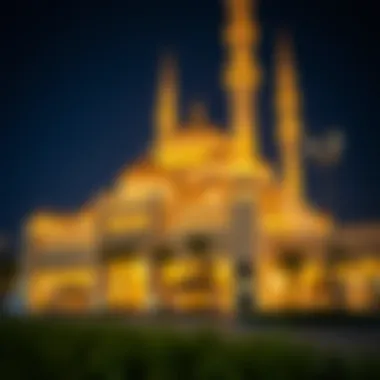

“Ramadan in Dubai is not just a month; it’s a festival that brings everyone together.”
Such gatherings also promote the idea of giving back, with many stalls pledging part of their profits to charitable causes, thus resonating with the spirit of Ramadan. Night markets are geared to welcome families with special events and entertainment, ensuring an inclusive experience for all.
- Features of Night Markets:
- Artisans showcasing local crafts
- Food stalls featuring traditional dishes
- Entertainment with music and performances
Family and Community Events
Family and community events during Ramadan in Dubai play a vital role in fostering a sense of togetherness and shared heritage among residents and expatriates alike. Stemming from the cultural richness of the UAE, these gatherings are centered around spiritual connection, joyful celebrations, and charitable engagement, making them key components of Ramadan's observance.
Cultural Festivals
Cultural festivals during Ramadan in Dubai are vibrant displays of tradition and unity. These events often showcase local arts, crafts, and culinary delicacies, embodying the spirit of the holy month. Participating in such festivals allows families to connect with one another, providing opportunities to learn about the cultural significance of Ramadan.
These festivals can be found in various locations such as public squares or malls, drawing large crowds. One notable event is the Dubai Ramadan Festival, which highlights activities for all ages, from traditional performances to interactive art exhibits. Festivals often evoke a festive atmosphere, where families stroll around, sampling exquisite iftar meals and engaging in activities like henna painting.
Consider attending the annual Arabian Nights festival, which features an array of entertainment, including live music and storytelling sessions focused on Islamic history. Such events not only strengthen community bonds but also promote cultural understanding among different nationalities residing in Dubai.
Social Gatherings
Social gatherings in Ramadan go hand-in-hand with the communal aspects of iftar, as families and friends unite to break their fast together. These gatherings highlight the significance of relationships during this special month, reinforcing the idea that the joy of coming together is as important as the act of fasting itself.
A typical social gathering may take place in a family's home, where intricate dishes are served. Expect to see long tables adorned with dates, hummus, and kebab. The atmosphere is filled with laughter and storytelling, often with families reflecting on their past Ramadan experiences, sharing lessons learned, and expressing gratitude for blessings received.
Additionally, local restaurants and hotels offer special Ramadan social packages, promoting iftar events that host larger groups. Such events encourage networking and are especially beneficial for expats looking to meet others in similar situations, allowing for deeper community ties.
"The spirit of Ramadan lies not only in fasting but in building stronger ties amongst family and friends."
By embracing these gatherings, residents and visitors alike gain a fuller understanding of the power of community during this holy month.
Challenges Faced During Ramadan
During the sacred month of Ramadan, numerous challenges come to the forefront for residents and visitors in Dubai. This period demands adjustments to different aspects of life, especially in a multicultural city like Dubai, where traditions from around the globe intersect. The importance of understanding these challenges cannot be overstated, as they directly affect everything from business operations to personal relationships.
Navigating Social Expectations
In Dubai, social norms during Ramadan can be both a source of connection and a tightrope act. As the sun sets, gatherings bloom and families break their fast together. However, not everyone partakes in this ritual. Expats and non-Muslims might feel a certain pressure to conform during this time. The need for balance is crucial – respecting Islamic customs without compromising personal beliefs.
The expectations include:
- Dress Code: Many take it to heart to dress more conservatively during Ramadan. This expectation creates an awareness of the cultural norms.
- Dining Etiquette: While it is common for Muslims to refrain from eating and drinking from dawn until dusk, non-Muslims are also expected to exhibit discretion. Eating publicly can draw disapproving glances or worse.
- Social Obligations: Invitations to iftar dinners are frequent, presenting a delicate situation for those who are not Muslim. Declining such invites, while perfectly acceptable, can be a challenge to navigate.
To better cope with these pressures, clear communication is key. Sharing one’s intentions and reasoning behind choices with friends or family members often helps alleviate misunderstandings. It's a time to embrace diversity while navigating the nuances of social conduct.
Health Considerations
The fasting observed during Ramadan brings about several health considerations worth mentioning. Observers fast from sunrise to sunset, which may spur health complications if not approached thoughtfully. In a city known for its lavish dining options and high temperatures, adhering to a fast can be taxing.
Key health points to keep in mind include:
- Hydration: Staying well-hydrated before and after fasting hours is crucial. Dehydration can lead to fatigue, headaches, and decreased cognitive function, making it essential for the community to prioritize drinking water during non-fasting hours.
- Nutrition: What’s on the iftar menu matters. Traditional foods, while delicious, can be heavy and rich. Opting for balanced meals loaded with essential nutrients helps in maintaining energy levels throughout the month.
- Physical Activity: Exercise routines might need reviewing. High-intensity workouts may not align well with fasting. Finding a balance between maintaining fitness and respecting fasting times is vital for well-being.
To sum it up, being mindful of health and navigation through social expectations plays a critical role in the overall experience of Ramadan in Dubai. It's a time for reflection not just spiritually, but also in terms of one's social interactions and well-being.
Culmination
The culmination of this article serves as a reflection on not just the spiritual significance of Ramadan in Dubai, but also its wider implications for the community and the various sectors intertwined within it. Understanding these elements helps to paint a clearer picture of what life in this vibrant city entails during the holy month.
Embracing Diversity in Dubai
Dubai stands as a melting pot of cultures, where individuals from all corners of the globe converge. During Ramadan, this diversity takes on a special glow.
- Cultural Exchange: Expatriates find themselves not just observing, but also participating in communal iftar gatherings, forging bonds that transcend cultural barriers. In these moments, one can witness the rich tapestry of traditions being shared. Local Emiratis passionately explain the significance of various dishes served during iftar, while expatriates introduce their culinary delights as well.
- Shared Values: Mutual respect becomes a cornerstone of this month. While Ramadan is predominantly observed by Muslims, the entire community partakes by supporting fasting individuals through thoughtful adjustments to daily activities. Shops often close earlier, and restaurants typically cater to a take-out model, showcasing local camaraderie.
Reflections on Ramadan's Influence
Ramadan's impact extends beyond the spiritual observances; it weaves itself into the very fabric of Dubai's socio-economic landscape.
- Economic Activities: Traditionally, the month sparks an uptick in business for several sectors. From retail to real estate, activities surrounding Ramadan can significantly drive demand. For instance, property owners may notice shifts in rental agreements as families often choose to host guests during this time, resulting in changes to housing dynamics.
- Civic Responsibility: The month encourages individuals to reflect on their roles within the community, offering a time to give back through charitable initiatives. Local organizations ramp up their outreach efforts, providing food and supplies to those in need, thus reinforcing the principle of charity inherent in Ramadan.
"Ramadan isn’t just a month of fasting; it’s a time for unity, charity, and reflection in the diverse landscape of Dubai."
In this context, it’s clear that Ramadan in Dubai goes beyond religious practice. It shapes community interactions, influences local economies, and fosters an environment steeped in understanding and respect among its diverse populations.



